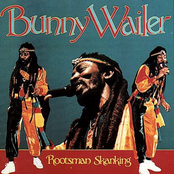Rootsman Skanking

Biography
Bunny Wailer is the stage name for three-time Grammy Award winner, singer, percussionist and devoted Rastafarian Neville Livingston (born 10 April 1947 in Kingston, Jamaica), known for the reggae classic Dreamland. He is founding member of reggae group The Wailers with Bob Marley and Peter Tosh. Bunny, Marley's step brother, toured with the band in England and USA after the success with the 1973 albums Catch A Fire and Burnin', but meant it was against Rastafari to perform for almost only white...
Bunny Wailer is the stage name for three-time Grammy Award winner, singer, percussionist and devoted Rastafarian Neville Livingston (born 10 April 1947 in Kingston, Jamaica), known for the reggae classic Dreamland. He is founding member of reggae group The Wailers with Bob Marley and Peter Tosh. Bunny, Marley's step brother, toured with the band in England and USA after the success with the 1973 albums Catch A Fire and Burnin', but meant it was against Rastafari to perform for almost only white people and left Wailers 1973. He then made a number of solo reggae albums. Blackheart Man (1976) is a good example of his religious roots reggae, and Rock 'n' Groove (1981) of solid uptempo Sly & Robbie based reggae. He started to tour internationally again and is regarded as one of the most important reggae artists ever. Bunny Wailer has won the Grammy Award for Best Reggae Album in 1991, 1995 and 1997.
- - -
Bunny Wailer, is a singer, songwriter and percussionist, born Neville O'Riley Livingston on April 10, 1947 in Kingston, Jamaica. He was founder and an original member of ska, rocksteady and reggae group The Wailers (formed 1963) along with Bob Marley and Peter Tosh. The young Livingston spent his earliest years in the village of Nine Mile in St. Ann Parish. It was there that he first met Bob Marley, and the two toddlers became fast friends. The boys both came from one parent families; Livingston was being brought up by his father, Marley by his mother. Later, Bunny's father Thaddeus "Toddy" Livingston lived with Bob Marley's mother Cedella Booker and had a daughter with her named Pearl Livingston. Peter Tosh had a son, Andrew Tosh, with another of Bunny's sisters, Shirley, making Andrew his nephew
Livingston was underused as a writer and lead vocalist in The Wailers compared with Marley and Tosh. When Wailers regularly changed producers during the early reggae years in the late 1960s, Livingston continued to be a key part of the group's distinctive harmonies. He sang however lead on "Dreamland" (a cover of El Tempos' My Dream Island, which soon became Bunny's signature song), "Riding High", "Brainwashing" and on one verse of the Wailers' Impressions-like "Keep On Moving", both produced by Lee "Scratch" Perry. In 1971, he recorded the original version of Pass It On
Bunny Wailer toured with the Wailers in England and the United States, but soon became reluctant to leave Jamaica. He and Tosh became more marginalized in the group as the Wailers became an international success, and attention was increasingly focused on Marley. Bunny Wailer and Peter Tosh subsequently left the Wailers to pursue solo careers. They were replaced by the I Threes, a move to broaden the base of success for the Wailers in the non-Jamaican market.
After leaving the Wailers, Bunny became more focused on his spiritual faith. He identified with the Rastafari movement, as did the other Wailers. He self-produced a number of his recordings after striking out on his own. He has also written much of his own material as well as re-recording a number of cuts from the Wailers catalogue. Bunny Wailer has recorded primarily in the roots style, in keeping with his often political and spiritual messages. The album "Blackheart Man" is a good example of his roots reggae style and the dub version,Dub d*sco vol 1 equally magnificent if hard to find. "Sings the Wailers" successfully reworks many of The Wailers songs with the backing of top Jamaican musicians, Sly and Robbie. He has also had success recording in the typically apolitical, more pop dancehall style. He has outlived his contemporaries in a culture where death by violence is commonplace.
Bunny Wailer has won the Grammy Award for Best Reggae Album in 1990, 1994 and 1996.
ALBUMS WITH ORIGINAL MATERIAL
* ''Blackheart Man'' (1976) [[Island Records|Island]]/Solomonic
* ''Protest'' (1977) Island/Solomonic
* ''Struggle'' (1978) Solomonic
* ''Dubd'sco vol.1'' (1978) Solomonic
* ''In I Father's House'' (1979) Solomonic
* ''Bunny Wailer Sings the Wailers'' (1980) Island/Solomonic
* ''Dubd'sco vol.2'' (1981) Solomonic
* ''Rock 'n' Groove'' (1981) Solomonic
* ''Tribute'' (1981) Solomonic
* ''Hook Line & Sinker'' (1982) Solomonic
* ''Roots Radics Rockers Reggae'' (1983) [[Shanachie Records|Shanachie]]
* ''Live!'' (1983) Solomonic
* ''Marketplace'' (1985) Solomonic
* ''Rootsman Skanking'' (1987) Shanachie (international re-release of ''Rock And Groove'' edited version plus 3 extra tracks)
* ''Rule Dance Hall'' (1987) Shanachie
* ''Liberation'' (1989) Shanachie
* ''Time Will Tell: A Tribute to Bob Marley'' (1990) Shanachie (international re-release of ''Tribute'' + 2 extra tracks)
* ''Gumption'' (1990) Shanachie
* ''The Never Ending Wailers'' (1991)
* ''Dance Massive'' (1992)
* ''Just Be Nice'' (1993) [[RAS Records|RAS]]
* ''Hall of Fame: A Tribute to Bob Marley's 50th Anniversary'' (1996) RAS
* ''Communication'' (2000) Solomonic/Tuff Gong
* ''World Peace'' (2003) Solomonic
* ''Rub A Dub'' (2007) Solomonic
* ''Cross Culture'' (2009) Solomonic
* ''Combinations Vol.1'' (2009) Solomonic
* ''Blackheart Man (Remastered & Extended)'' (2009) Solomonic
* ''Reincarnated Souls'' (2013), VP - 3CD + 2DVD set Read more on Last.fm. User-contributed text is available under the Creative Commons By-SA License; additional terms may apply.

